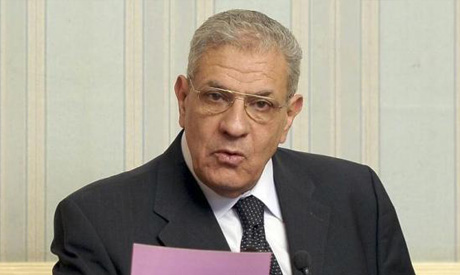A series of deadly militant attacks in North Sinai on Thursday have killed at least 30 people

Egypt's Prime Minister Ibrahim Mahlab
Egypt's Prime Minister Ibrahim Mahlab has called on states and human rights organisations to "record and witness Egypt's sacrifices in the face of terrorism" following a series of militant attacks in Sinai on Thursday left at least 30 people dead, including both army personnel and civilians.
Mahlab, in a statement released on Friday, said Egypt's sacrifices aim to defend the entire world from terrorism.
He added that Egypt has already warned that terrorism has become an "advanced industry and a global trade" and said that international cooperation is needed to face the problem.
The prime minister's message addressing human rights organisations comes a day after Human Rights Watch released a statement saying that rights conditions in Egypt are "in sharp decline" and there is “no light at the end of the tunnel."
Exact figures for casualties in Thursday's attack have yet to be announced by officials, although media reports suggest that at least thirty have been killed.
In the wake of the attacks, President Abdel-Fattah El-Sisi cut short a visit to Addis Ababa, where he was attending the 24th African Union Summit, to return to Cairo.
Following the attack, the armed forces said in a statement that the violence came in response to the "successful" security campaign against militants in the restive province, without elaborating further on the number killed.
Attacks by militant groups based in North Sinai have spiked since the ouster of president Mohamed Morsi in July 2013, with security forces being the primary targets. The armed forces have responded by waging a military campaign aimed at eradicating militants from Sinai.
Sinai-based militant group Ansar Beit Al-Maqdis claimed responsibility for Thursday's attacks on an affiliated Twitter account.
The group, which has said it is behind a number of attacks in the peninsula, recently pledged its allegiance to the Islamic State (ISIS), the militant group which controls large swathes in Iraq and Syria.

Egypt's Prime Minister Ibrahim Mahlab
Egypt's Prime Minister Ibrahim Mahlab has called on states and human rights organisations to "record and witness Egypt's sacrifices in the face of terrorism" following a series of militant attacks in Sinai on Thursday left at least 30 people dead, including both army personnel and civilians.
Mahlab, in a statement released on Friday, said Egypt's sacrifices aim to defend the entire world from terrorism.
He added that Egypt has already warned that terrorism has become an "advanced industry and a global trade" and said that international cooperation is needed to face the problem.
The prime minister's message addressing human rights organisations comes a day after Human Rights Watch released a statement saying that rights conditions in Egypt are "in sharp decline" and there is “no light at the end of the tunnel."
Exact figures for casualties in Thursday's attack have yet to be announced by officials, although media reports suggest that at least thirty have been killed.
In the wake of the attacks, President Abdel-Fattah El-Sisi cut short a visit to Addis Ababa, where he was attending the 24th African Union Summit, to return to Cairo.
Following the attack, the armed forces said in a statement that the violence came in response to the "successful" security campaign against militants in the restive province, without elaborating further on the number killed.
Attacks by militant groups based in North Sinai have spiked since the ouster of president Mohamed Morsi in July 2013, with security forces being the primary targets. The armed forces have responded by waging a military campaign aimed at eradicating militants from Sinai.
Sinai-based militant group Ansar Beit Al-Maqdis claimed responsibility for Thursday's attacks on an affiliated Twitter account.
The group, which has said it is behind a number of attacks in the peninsula, recently pledged its allegiance to the Islamic State (ISIS), the militant group which controls large swathes in Iraq and Syria.







Post a Comment